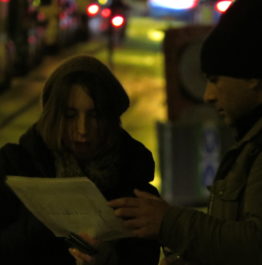Sciences Po Refugee Help
Though rising populist leaders, spreading islamophobia, and isolationist tendencies have threatened the future of refugees around the world, students at the leading French University, Sciences Po, have created an organization called Sciences Po Refugee Help which aims to provide emergency and integration aid to asylum seekers in France.
Sciences Po Refugee Help’s main objective is to materially and immaterially improve the living conditions of refugees. The organization brings together asylum seekers with students who are passionate about helping refugees in an effort to as they put it, “bridge the gap between those in need and those willing to act”.
Founded in 2015, Sciences Po Refugee Help has adopted an apolitical rights-based approach which involves them being present on the ground as well as using their volunteers’ political knowledge to lobby at a state and UN level. Though the organization is based in Paris, their services extend beyond the nation’s capital.
The organization is exclusively made up of students.
“Created after a call for help in September 2015, we now have the highest number of active volunteers than any other association at Sciences Po," said President of Sciences Po Refugee Help, Yann Lebec.
But make no mistake, this is not your typical university club. Sciences Po Refugee Help is a certified 1901 law association which allows its members to operate within a legal framework.
"I am so happy that students from Sciences Po have founded Sciences Po Refugee Help” said Director of Sciences Po, Frédéric Mion “What they are doing is an honour to Sciences Po, and goes towards supporting the values in which we believe, of openness and generosity."
So how does the organization assist refugees?
Sciences Po Refugee Help functions at many levels. The organization provides basic material needs to asylum seekers. But rather than make assumptions about what the refugees may need, the organization conducts needs assessments in migrant camps and housing centers. Last year for instance, the organization provided running shoes to asylum seekers who were wearing flip-flops during Paris’s cold winter.
They also provide French lessons in four different locations throughout Paris and organize social activities which they believe are “essential to the maintenance of a humane quality of life for refugees.” Last October, Sciences Po Refugee Help brought 20 residents of the Loiret center to the Grande Mosquée of Paris.
The organization’s “Asylum Aid Team” assists asylum seekers in their application process for refugee status. Because of their understanding of the French and EU asylum system as well as their capacity to translate from Farsi and Arabic to French, the team is able to advise on “the asylum procedure, help explain asylum seeker’s rights, accompany asylum seekers to medical visits, check over necessary forms, and redirect applicants to the appropriate organizations when necessary.”
With a series of terrorist attacks throughout the nation over the past few years, islamophobia has been on the rise in France. The alt-right wing, anti-refugee presidential candidate Marine Le Pen—famous for villainizing asylum seekers—has been gaining an alarming amount of support. Her victory would intensify an already dire crisis and would institutionalize islamophobia as a legitimate foreign policy. Many media outlets and academics have maintained that rising islamophobia will only increase the likelihood of radicalisation and terrorist attack on French soil.
Organizations like Sciences Po Refugee Help remind us that we are all humans capable of empathy and respect, and deserving of a chance for a decent life. Though the organization is still in its infancy, by bridging the gap between communities that are increasingly being pegged against one another, Sciences Po Refugee Help reminds us of a need for a humane approach to refugee and development policies.
Read your stories
The Paris Globalist -

Sciences Po Refugee Help
by Melissa Godin
